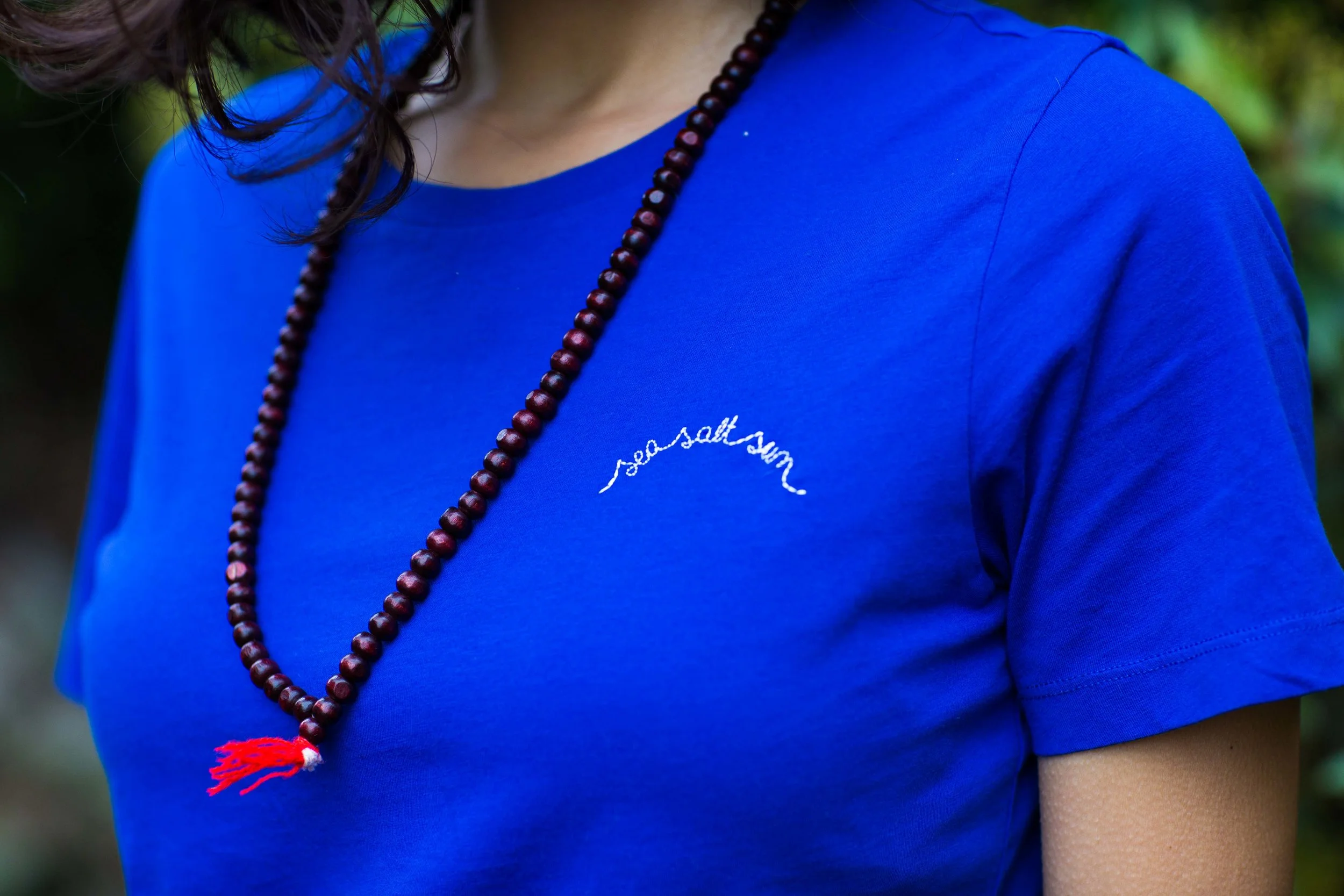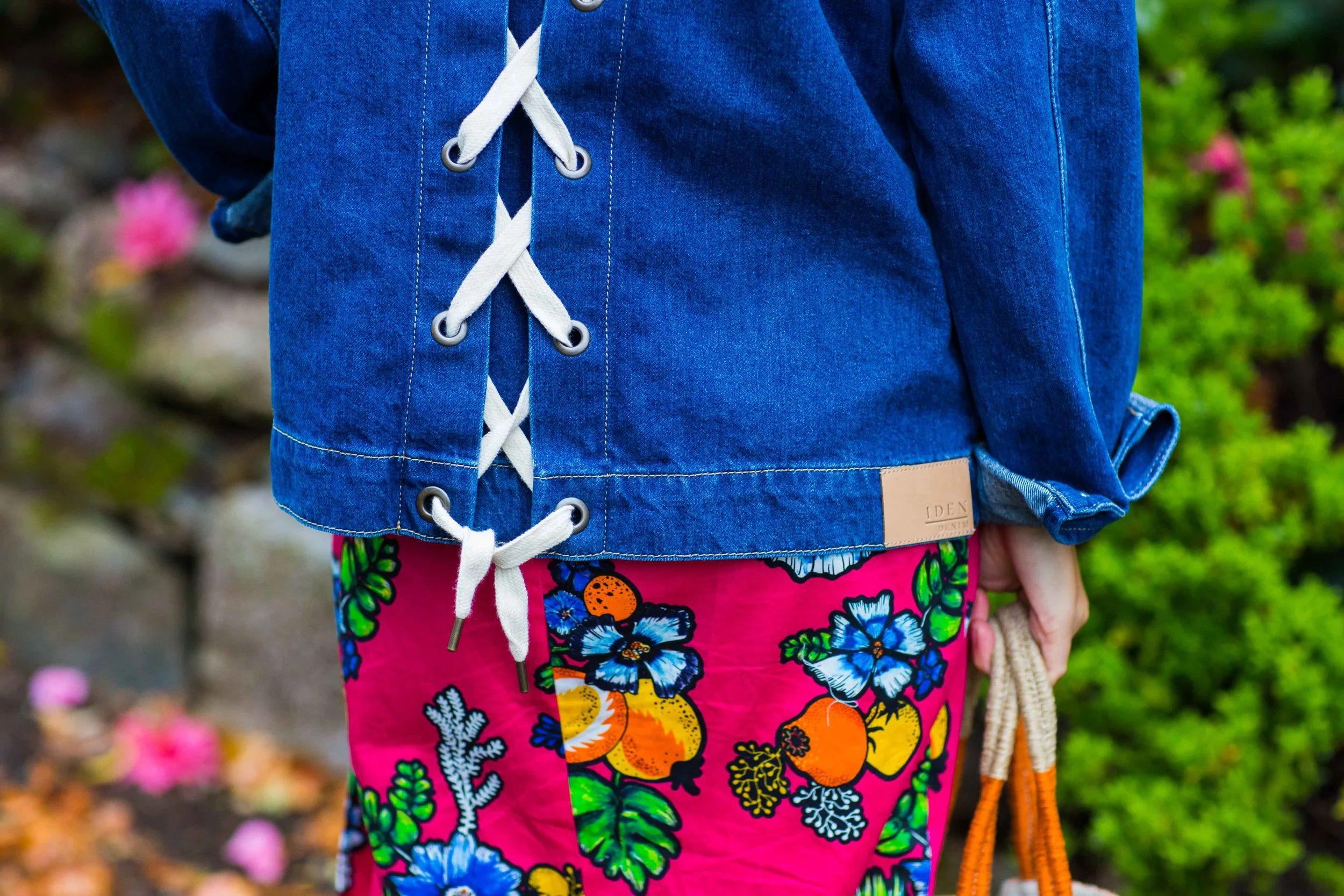FASHION REVOLUTION WEEK: DAY 7
CLOSED t-shirt, ASOS MADE IN KENYA skirt, IDEN denim jacket, Salt-Water Sandals and Maison Bengal bag
It's the final day of my challenge — oh, how a week flies by! As challenges go, this wasn't a tough one thanks to all the beautiful choice out there. I've had lots of fun discovering new brands with fantastic stories, brands creating "fashion with feeling" and pioneering changes we'd all like to see become the norm, not the "alternative" in the fashion industry. One of the best parts of this week has been all the conversations it has started and all your feedback, so thank you for engaging. I have loved discovering your favourite sustainable brands, and learning from your different experiences and opinions. Being able to chat about this important topic has highlighted so much, from the scale of the problem to the more positive sides of the industry, and it has showcased the good side of social media for opening dialogue. I hope that through sharing this week of outfits, in some small part, I was able to show you that ethical fashion isn't just kaftans (though I do love kaftans); you can dress for the office, the school-run, the evening and the day-to-day, mixing both high-end and high street sustainable brands, vintage items, charity shop finds or simply reinventing and reimagining what you already have.
"Many thanks to Fashion Revolution, who created this annual week to highlight the cause and encourage a more sustainable future for us all."
I wanted to draw this week to a close by sharing some of my favourite resources for learning more about ethical and sustainable fashion. First is Positive Luxury, a website dedicated to sharing the latest news and products from brands who are sustainably aware. I also love Eco Age, a consultancy that I've mentioned throughout the week, founded by Livia Firth, and which helps brands move towards a more ethical future. They work closely with figureheads like Emma Watson to champion the movement. And I extend many thanks to Fashion Revolution, who created this annual week to highlight the cause and encourage a more sustainable future for us all, while putting pressure on the governments to do the same. I urge you to sign their manifesto if you haven't already.
"Never has there been a better time to work together as a community for collective rapid and positive change."
There will be times in our lives where we can truly make a difference and, in 2018, it feels like we are really in a position to make our opinions heard and drive change in the garment industry. From workers' rights to transparent supply chains and the pollutants used in manufacturing processes to the amount we are purchasing, if we vote for what we believe in with our money — via our purchasing power — and continue to demand changes, then things will start to happen. Think of the success of banning smoking in public places: in just a short time, we can barely fathom the idea that anyone smoked on airplanes, in trains, nightclubs or restaurants, and now the plastic bag tax and the plastic straw ban too will hopefully be a catalyst of change for the way we think about and look after our planet. We live in a commercially driven world that promotes being an individual and self-interest above all else, but never has there been a better time to work together as a community for collective rapid and positive change, so what are we waiting for?
For the last hurrah of my Fashion Revolution Week Challenge, I'm out and about in an outfit that tickles me pink. I optimistically packed for a sunny weekend in Devon and I got rain and more rain, but hey ho, I'll pretend I'm on holidays anyway, ‘cause I kind of am. Some of my most-loved sustainably made items are from ASOS's Made in Kenya range and this fruity, floral cotton pencil skirt with a sash detail sings sunshine. Teamed with an equally bright tee, my favourite Salt-Water sandals (which are just so comfy) and a Bengalese woven bag I got on holiday last year (in Sicily, but you know) for carrying around everything I needed for day trips on my bike. It's a Sunday fun day kind of day...
CLOSED
German brand Closed has been committed to ethical fashion since 1978. They originally started with denim, but over time have extended to everything from knitwear to footwear. All components of the sandals I am wearing were handmade by traditional Italian companies. Many of the manufacturers Closed works with today have been with them, and remained the same, for decades. Every step of the product line is assessed from sourcing to testing for pollutants – to ensure every element is as sustainable as possible.
ASOS MADE IN KENYA
ASOS MADE IN KENYA collection works with SOKO Kenya to actively improve the lives of members of the local community. The initiative offers skills and support to drive sustainable development and help build a global community through fashion. Empowering, educating and enabling sustainable change. SOKO Kenya, who have worked with ASOS since 2010, are a clothing manufacturer that provide fair and safe employment and training for some of the country’s poorest communities. ASOS provide ongoing practical support and employee training to help develop the SOKO Kenya team. SOKO Kenya has grown from four to over 50 employees over the last eight years.
IDEN
British brand IDEN believes that great fitting jeans in premium denim fabrics need not cost the Earth. Using fabrics from pioneering mills, with an emphasis on natural, organic and recycled materials, they aim to create a thoughtfully sourced collection that is as kind to your wallet as it is to the environment.
SALT-WATER SANDALS
Salt-Water Sandals is on a mission to reduce its footprint and continue working towards being a 100% ethical and sustainable brand. The brand's sandals are still manufactured in the same U.S. factory that was used when the brand started in the 1940s. Most employees are flexible and move around the factory as well as being trained in the multiple parts of the manufacturing process. In the U.S. factory, each pair of shoes goes through 13 people before being delivered to your door. Likewise, Salt-Water has also recently overhauled its packaging to ensure it's as environmentally friendly as possible.
MAISON BENGAL
Maison Bengal is a social enterprise that aims to provide some of the poorest people in Bangladesh with a decent and reliable wage. The brand works with local fair trade organisations, each one best placed to identify the most marginalised communities and provide training in handicraft production.





